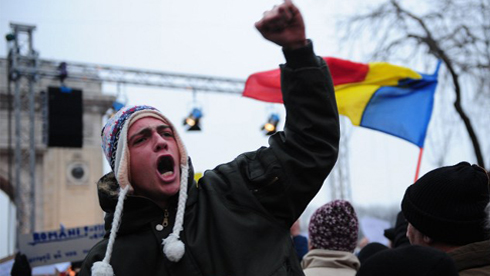The twenty-fifth anniversary of the uprising of the workers of Braşov [November 14, 1987, in which 300 anti-Ceauşescu demonstrators were arrested] went by nearly unnoticed. Yet, Romania's current social reality should have made this event more significant. There are several reasons for this indifference to one of the most important movements of our recent history. But I would like to point out what this quasi-total forgetfulness reveals about the direction Romanian society is taking.
A quarter century after a worker's uprising should have been a good opportunity for trade unions to take action. But they, once again, showed their indifference to and their dependence on interests other than those of the "wage-earner".
The authorities in Bucharest also ignored the event, in contrast with their attitude five years ago, for the 20th anniversary, when they showed a spark of interest in history – as they did a few weeks ago when they celebrated the birthday of King Michel, who achieved the venerable age of 91.
This contrast shows to what degree this memory-loss characterises the personalities of our leaders. The 1987 rebellion is the one that, more than the revolution of 1989 which was mired in plotting, could be presented to the younger generation as the symbol of uprisings and repression typical of the Communist regime. But, because it is not presented this way, it is fair to assume that the current political class feels closer to the nomenclature than to the workers of Braşov, who rebelled in 1987 and were laid off afterwards in 1990.
Political identity
These days, the media is full of corruption and scandal, and the young people who see only this, will be more easily manipulated because they lack the cultural and historic references with which to interpret these events.
In a country without political identities, where everything seems temporary, only historical experience provides the context to allow people to stop themselves being manipulated. Through whatever lens the events [surrounding the 1989 anti- Ceaușescu revolution] were seen, the lesson is that Romania has no other option but Europe.
The generation raised during the transition is different. This year, for the December 9 legislative election, those born as recently as 1994 will be eligible to vote. Looking back chronologically at the events that have shaped them, the first would be the July 2012 referendum to remove PresidentTraian Băsescu, which along with the January and February urban demonstrations, were the most important events of the year.
It can also be noted that in December 2011, President Băsescu totalled the same number of years in power as Romania's first post-Ceaușescu president, Ion Iliescu, and that this is Băsescu's eighth year in office.
Media manipulation
From a political perspective, these young people were born in a climate of partisan media that has influenced the interpretation of political events and is particularly distinguished by the pro- and anti-Băsescu cleavage. Even if it is cyclical, this split is all the more important for this new generation because it profoundly affected the education system.
From primary schools to high schools all the way to public and private universities, the great majority of teachers responsible for educating these youngsters felt themselves "victims" of the policies supported directly or indirectly by the president.
This type of generalisation is dangerous and there are of course exceptions. But, historically speaking and from a political perspective, it can be said that the generation raised during the transition is the first born during the rebellion against policies that, whatever their reprehensible faults, can be qualified as reformist.
The anti-Băsescu generation also wants change but its thirst for change has been diverted in favour of those who oppose change. This generation also wants "Europe" but its energy has been side-tracked by those who favour nationalist-populist rhetoric rather than a pro-European vocation.
It is only after December 9 that harsh reality will shred this web of ideas in which this generation, deeply marked by the anarchy of transition, is now entangled. But no one can foresee how they will express their future rebellion.
Was this article useful? If so we are delighted!
It is freely available because we believe that the right to free and independent information is essential for democracy. But this right is not guaranteed forever, and independence comes at a cost. We need your support in order to continue publishing independent, multilingual news for all Europeans.
Discover our subscription offers and their exclusive benefits and become a member of our community now!












